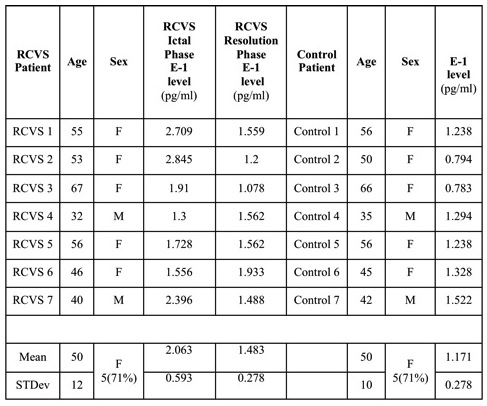Session Information
Date: Monday, November 9, 2015
Title: Vasculitis Poster II
Session Type: ACR Poster Session B
Session Time: 9:00AM-11:00AM
Plasma Endothelin-1 parallels the vasoconstriction phase in
Reversible Cerebral Vasoconstriction Syndrome
Background/Purpose: Cerebral vasoconstriction is thought to be the underlying
pathogenetic mechanism of Reversible Cerebral
Vasoconstriction Syndromes (RCVS). However, mediators of the syndrome at molecular levels have not been
elucidated. We previously reported that Endothelin-1
(E-1), a potent vasoconstrictor, is increased during the
acute vasoconstrictive
(ictal) phase in RCVS as compared to matched
controls. Herein, we report on the levels of E-1 in the resolution phase of RCVS as compared to the ictal phase.
Methods: 14 paired samples from 7 patients were identified from
the Cleveland Clinic prospective RCVS registry, who had blood
samples collected during the ictal and resolution phases of RCVS symptoms.
Further, E-1 levels were measured from 7 healthy controls of similar race and
gender, who were then matched to the RCVS patients using
a one-to-one Greedy matching algorithm based on age. Plasma E-1 levels were measured using Quantikine Endothelin-1
enzyme-linked immunosorbent assay kit (from R& D Systems) according to the
user manual. Average E-1 levels at the ictal phase of RCVS were compared to the
average E-1 levels during the resolution phase and matched healthy patients
using mixed effects modeling to account for matched group clustering.
Results: The RCVS and control groups were well
matched with respect to age and sex (table 1). During RCVS ictal phase, average plasma
E-1 level (pg/ml) was
significantly higher compared to resolution phase E-1 levels (2.063 ±
0.593 vs. 1.483 ± 0.278, p = 0.037). There was no difference between E-1
levels of RCVS at the resolution phase and healthy matched controls (1.483 ±
0.278 vs. 1.171 ± 0.278, p =0.312). Two RCVS patients (RCVS 4 and 6) did
not have complete radiologic resolution of vasoconstriction at follow-up
testing. When excluding these 2 patients, the difference between the average E
-1 levels during RCVS ictal phase and resolution phase was significantly higher
(2.317 ± 0.487 vs. 1.377 ±
0.223, p = 0.004), while average E-1 levels at the resolution phase remained
not significantly different compared to healthy matched controls (1.377 ±
0.223 vs. 1.115 ± 0.319, p=0.262).
Conclusion:
Plasma Endothelin-1 (E-1) levels decrease to normal levels during the
resolution phase of RCVS. This is more apparent in patients with complete
resolution of radiological cerebral vasoconstriction, compared to those with
persistent radiological vasoconstriction. These results suggest a major role of E-1 in the pathogenesis of RCVS.
Table 1
To cite this abstract in AMA style:
John S, Calabrese LH, Maya JJ, Massiello A, Uchino K, Erzurum S, Janocha A, Hajj-Ali RA. Plasma Endothelin-1 Parallels the Vasoconstriction Phase in Reversible Cerebral Vasoconstriction Syndrome [abstract]. Arthritis Rheumatol. 2015; 67 (suppl 10). https://acrabstracts.org/abstract/plasma-endothelin-1-parallels-the-vasoconstriction-phase-in-reversible-cerebral-vasoconstriction-syndrome/. Accessed .« Back to 2015 ACR/ARHP Annual Meeting
ACR Meeting Abstracts - https://acrabstracts.org/abstract/plasma-endothelin-1-parallels-the-vasoconstriction-phase-in-reversible-cerebral-vasoconstriction-syndrome/

